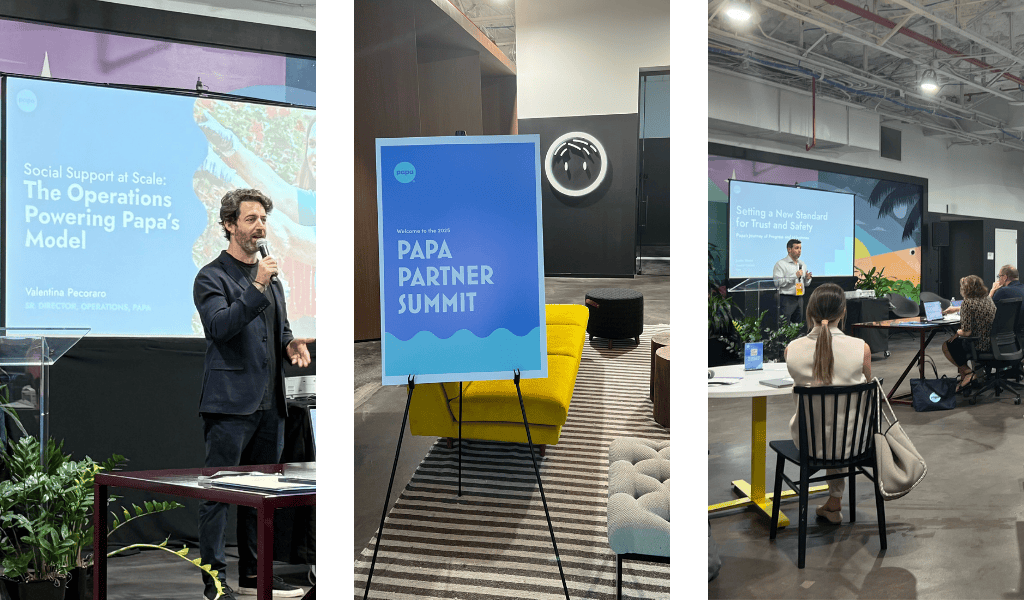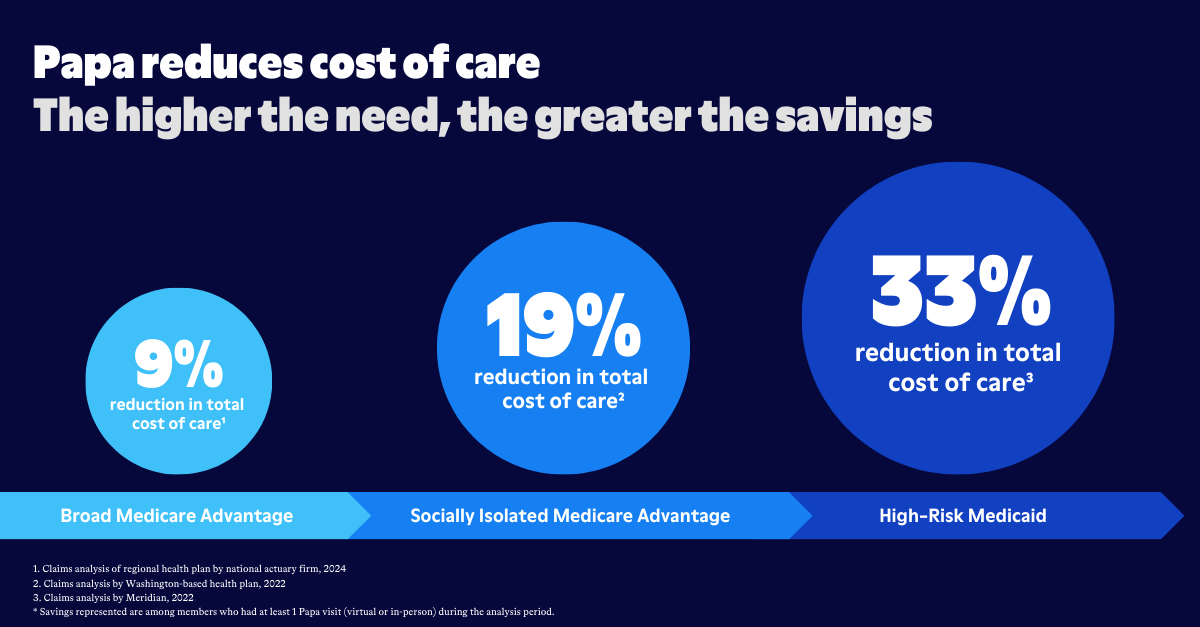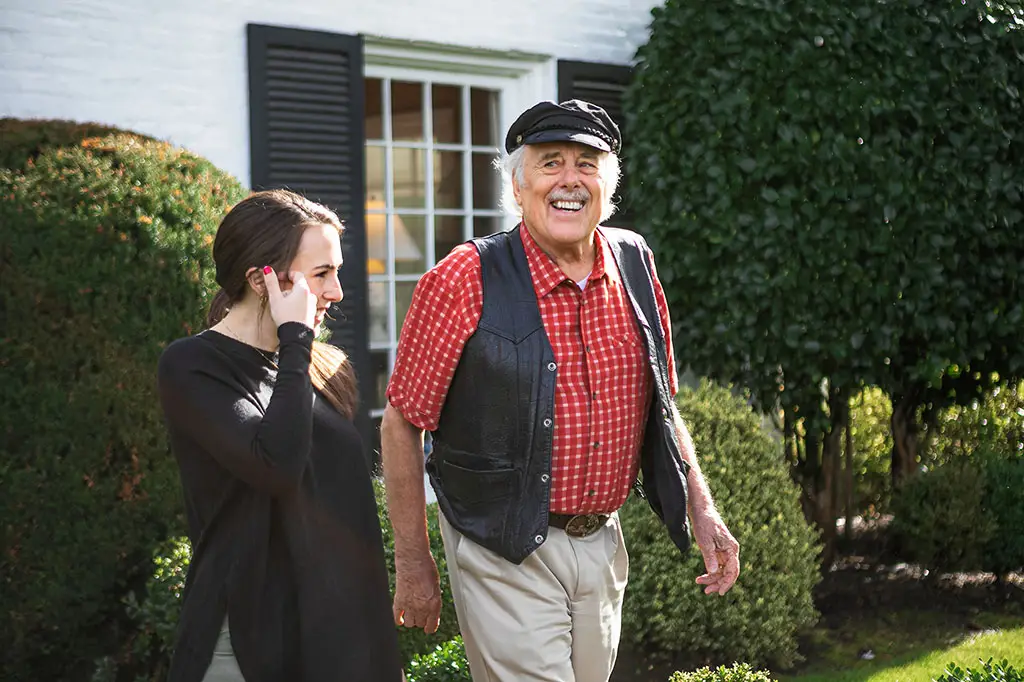
This week, the Papa team gathered with many of our valued partners, as well as industry thought leaders for our first annual Pathfinders Summit. Over the course of two days, we heard from a group of visionary thought leaders in the health care industry on topics ranging from AI health care navigation to innovative care for our aging population to the medical use of psychedelics to treat depression in older adults.
Big ideas were shared, and big promises were made.
We had meaningful conversations. We ate great food. We shared beautiful views. We toasted care gaps closed. And we made plans to close even more in 2023.
We did it all while forging new partnerships, making new friends, and learning about some of the most pressing issues in the health care industry.
Takeaway #1: Sometimes a human touch heals faster than the most innovative medical advancements
Medical advancements save lives. We know that, and we are grateful for the amazing innovators who work tirelessly to bring the best medical technology, the newest medicines and the most advanced health care techniques to our clinics and hospitals.
Sometimes, the panacea isn’t the latest and greatest innovations butinstead, it’s the human touch.
One story we heard from Geriatrician Dr. Carla Perissnotto was about an 82-year-old man named John. John took a bad fall during covid and found himself homebound and socially isolated. This isolation left him prone to serious medical issues like depression, heart disease and more. Dr. Perissnotto shared that John himself was his own biggest advocate: He knew he didn’t need bigger hospitals with more med tech or newer medications, he just needed a way to leave his house. To grab a cup of coffee. To pick up prescriptions. To attend health care visits. To go on a walk in the park.
Throughout this panel discussion, we learned that social support solutions are proving to be truly innovative medicine–leading to big results. One study presented by Dr. Ellen Rudy showed a 34% reduction in high ED utilizers and a 14% reduction in hospital readmissions. Another showed a 33% reduction in overall cost of care.
Attendee Rena Walters shared that after hearing these sessions, she plans to be a bit more vigilant in considering the impacts of social factors like loneliness and social isolation on member health.
Sometimes, the most innovative medical solutions are simple. As simple as help up the stairs. A ride to the pharmacy. A human touch.
Takeaway #2: Creativity is thriving in health care
Previously, had you asked us to list creative professions, we would have mentioned artists, actors, musicians and writers.
But health care? Probably not. And we would have been so wrong.
At Pathfinders, as we listened to John Sculley (former CEO of Apple and Pepsi), we realized pretty quickly that creativity is thriving in health care. Sculley shared some of the really exciting advancements being made in the health tech industry, especially when it comes to AI. AI integrations are just starting to emerge, but it’s clear they will make a huge impact on the way health care companies are going to be able to care for their patients.
We also heard from Eric Hunter from Care Oregon. He told us a story about how a community organization gave out air conditioning units in an effort to ensure that all members of a community had access to a safe place to live. A few months later, they realized that many people in that community didn’t have access to electricity, so those units sat in boxes. This was a wake-up call, demonstrating that if we don’t meet patients where they are, we as health care providers will spend a whole lot of money doing things that may not be helpful.
Hunter urged health care providers to get creative with the ways they care for people. He explained that sometimes the creative solutions– the ones that are just a little bit out of the box– can be the most impactful.
It’s clear that health care professionals who are comingup with new and creative care solutions to reach member needs are making huge strides toward improved health.
Takeaway #3: Being in one big room is inspiring… and energizing
We love ourselves a good Zoom call. We love the fact that in our post-covid world, we have all honed the ability to meet virtually, to discuss business with people in other states and other time zones, to be more agile and flexible as we do business.
But there’s just something about being all in one place. Together. In one room.
At the Pathfinders Summit, the energy in the room was palpable.
When author Kristen Radke shared about the writing and inspiration behind her amazing graphic novel Seek You, it was an emotional experience for many of us. While each person in the room came from a different place with different experiences, the entire room seemed to connect with what Kristen was saying:
Loneliness hurts. It kills. And we owe it to each other as human beings to work toward a more connected world.
Attendee Pragnesh Shah shared that in the course of the summit, he realized how important it is for each of us to stay connected. To each other and to the people we work to serve. He felt energized by the idea that even small steps toward addressing isolation could make a big difference in health.
Takeaway #4: Home is healing
When Papa CEO, Andrew Parker, started noodling a new kind of care to address the needs of his own Papa, he knew that home could be healing.
He knew that the vast majority of older adults wanted to age in place, and that finding solutions to keep older adults in their homes could be a game-changer for their health.
What he didn’t know back in 2017 when he founded Papa was that in a matter of years, we would face a nationwide pandemic, one where nearly every American would be forced to stay in their home. He also didn’t realize that that shift to home would inspire a massive transformation to the entire American health care system.
In a session about how the move to the home is the biggest trend in health care in 2023, neurologist Dr. Ray Dorsey shared with us how he is bringing health care into the homes of older adults suffering from Parkinson’s disease.
He shared how the traditional assumption that the best health care comes in a clinical setting has been challenged again and again in the last few years. Anecdotally, an older adult struggling with mobility issues faces huge challenges just getting to a doctor’s appointment. By the time they walk in from a parking lot and check in, they’ve often spent upwards of 45 minutes and haven’t even seen a doctor! Dr. Dorsey explained that by meeting patients where they are, they get better care.
Eric Hunter followed this up with some data. He shared about a pilot done at CareOregon that provided in-home care coordination work in low-income homes. By just helping people to engage with the health care system, there was a vast improvement in all types of care. People started going to dentist appointments, outpatient mental health appointments, and screening appointments on a much more regular basis.
Hunter went on to explain how remote care is a powerful tool for health care providers. He demonstrated this by asking the audience who had been to a bank teller in the last month. One or two people raised their hands. Then he asked who had withdrawn money from an ATM. A few more people raised their hands. Then, he asked who had opened their bank account on a mobile device and the entire audience raised their hands.
Health care needs to get away from “bankers hours”-- people need access to care in a place where it’s convenient and at times that are outside of the 9-5. The move to the home is a starting point from which we can help meet patients where they are in order to promote health equity and improve overall health.
Takeaway #5: Culture has a micro and macro impact on community health.
Dr. J. Nwando Olayiwola, Chief Equity Officer at Humana, explained how her position at Humana was created after the tragic killing of Breonna Taylor. After Taylor’s death, Humana realized that health in their community was contingent upon working to remove barriers to health for all populations.
As a health equity officer, Dr. O (as she asked us to call her) spends every day working to understand how each population can be best served by our health care system. She explained how her work is essentially to zoom out to understand what entire populations need and then to zoom back in to create equitable experiences for all people.
Dr. O shared how she is learning how important culture is for health. She explained how her own Nigerian culture, which really values family and generational connection, has helped shape her own perspectives on health. She also understands that the unique social, racial, and even generational cultures that make up different communities play a huge role on the health of the individuals in those communities.
Dr. O’s fellow panelist, Dr. Geeta Nayyar shared some research about African American workers who felt reluctant to return to the office after the pandemic. They reported that after working from home during the pandemic, the microaggressions faced in office settings became more apparent and they felt psychologically safer when working remotely. Dr. Nayyar went on to explain that a toxic culture– whether it’s in a community, an office, a family--isn’t going to change unless there is an intentional effort to change it.
The needs of different demographics need to be understood at a macro level, so that the individuals within that demographic can be reached on a personal basis. Dr. O and Dr. Nayaar agreed that this is the starting point in working toward health equity.
Concluding thoughts
Attendee Emily McGrath shared with us that she is leaving the conference feeling empowered. She is considering how she (and all of us) can better integrate social support into health care. Over the past few days, she’s thought a lot about the role of social factors on health. A lot of work has been done, but there is so much more to do.
We agree.
There’s a lot of work to do.
But we are leaving inspired, encouraged and ready to dive in.
In the coming weeks, we plan to release much more content from the Pathfinders summit. We will release video recordings of most of the sessions, plus related notes, takeaways and other tidbits. Stay tuned.


